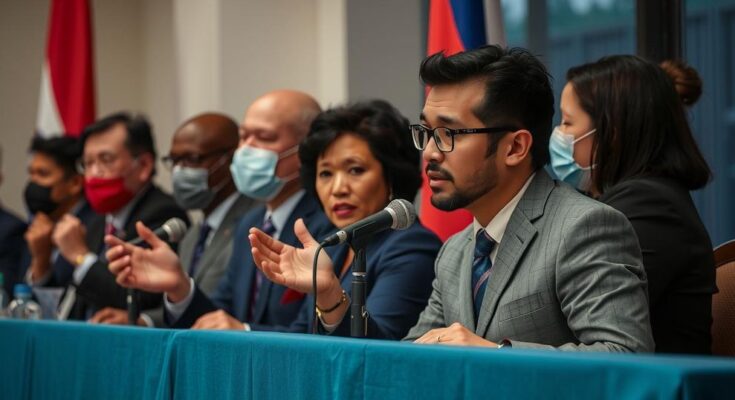Venezuelan opposition figures in Argentina’s Embassy claim to be facing a government-imposed siege, citing over a month without electricity. They allege that the Maduro administration is violating their human rights. Interior Minister Diosdado Cabello denies these claims, insisting that such disruptions stem from unpaid services. The political climate remains tense following disputed elections and complications in Argentina-Venezuela diplomatic relations.
Five Venezuelan opposition members currently taking refuge in Argentina’s Embassy in Caracas have reported an ongoing power outage that has lasted over a month, which they have characterized as part of a governmental “siege” imposed by President Nicolás Maduro. The activists have been residing in the Embassy since March following the issuance of arrest warrants for alleged activities aimed at destabilizing the government. In their statements, they have claimed that the government cut electricity supplies to the facility in late November and that these conditions have led to significant hardships, including lack of water.
Magalli Meda, an advisor to opposition leader María Corina Machado, voiced her concerns on social media, stating, “It is a violation of our human rights.” She emphasized the detrimental effect of thirty-five days without electricity, describing the situation as an “embassy prison.” Interior Minister Diosdado Cabello has dismissed these claims, attributing the service disruptions to unpaid bills rather than a deliberate siege.
The political backdrop involves claims from the Machado-led opposition that their presidential candidate, Edmundo González Urrutia, won the elections on July 28, a result that was contested by the electoral commission, which declared President Maduro the winner. The legitimacy of these elections has been questioned by various countries.
Following tensions in Argentine-Venezuelan relations, it is noted that diplomatic personnel from Argentina vacated the Embassy in August due to public doubts raised by Argentine President Javier Milei regarding the election results. Meda further asserted that Venezuelan authorities have obstructed the arrival of foreign diplomats, stating, “No ambassador has come to this Embassy, not one. Have they tried? Surely some would like to.”
The situation has been exacerbated by the recent detention of Argentinian border guard officer Nahuel Agustín Gallo in Venezuela on terrorism charges, leading the Milei administration to express outrage at what they perceive to be an unfounded abduction.
The current situation of Venezuelan opposition figures in Argentina’s Embassy reflects the heightened tensions within Venezuela, marked by an atmosphere of repression against dissent. Following controversial presidential elections in July 2023, where the ruling party claimed victory amidst widespread allegations of fraud, several opposition leaders have sought refuge in embassies to evade arrest. The government, led by President Nicolás Maduro, has maintained a firm grip on power, often silencing opposition voices and inhibiting foreign diplomatic engagement in domestic matters, straining international relations further. The backdrop of Argentina’s own complicated diplomatic ties adds another layer to this precarious situation.
In summary, the predicament faced by the Venezuelan opposition members holed up in Argentina’s Embassy highlights severe allegations of human rights abuses by the Maduro administration, demonstrated by prolonged disruptions in basic utilities. Despite government denials of a siege, the lack of diplomatic engagements due to threats against foreign ambassadors compounds the dire situation for these activists. As international scrutiny of Venezuela’s political climate continues, the developments surrounding these events remain crucial indicators of the broader struggle for democratic governance in the country.
Original Source: www.batimes.com.ar




